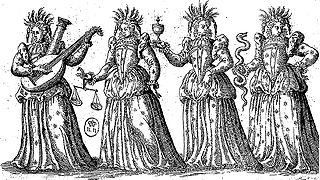
Canonization is the declaration of a deceased person as an officially recognized saint, specifically, the official act of a Christian communion declaring a person worthy of public veneration and entering their name in the canon catalogue of saints, or authorized list of that communion's recognized saints.

Michael is a usually masculine given name derived from the Hebrew phrase מי כאל mī kāʼēl, 'Who [is] like-El', in Aramaic: ܡܝܟܐܝܠ. The theophoric name is often read as a rhetorical question – "Who [is] like [the Hebrew God] El?", whose answer is "there is none like El", or "there is none as famous and powerful as God." This question is known in Latin as Quis ut Deus? Paradoxically, the name is also sometimes interpreted as, "One who is like God."

A multiple birth is the culmination of one multiple pregnancy, where in the mother gives birth to two or more babies. A term most applicable to vertebrate species, multiple births occur in most kinds of mammals, with varying frequencies. Such births are often named according to the number of offspring, as in twins and triplets. In non-humans, the whole group may also be referred to as a litter, and multiple births may be more common than single births. Multiple births in humans are the exception and can be exceptionally rare in the largest mammals.

Maeve, Maev or Maiv is a female given name of Irish origin. It comes from the Irish name Méabh, which was spelt Meadhbh in early modern Irish, Meḋḃ or Meaḋḃ in Middle Irish, and Medb in Old Irish. It may derive from a word meaning "she who intoxicates", "mead-woman", or alternatively "she who rules". Medb is a queen in Irish mythology who is thought to have originally been a sovereignty goddess.

Penance is any act or a set of actions done out of repentance for sins committed, as well as an alternate name for the Catholic, Lutheran, Eastern Orthodox, and Oriental Orthodox sacrament of Reconciliation or Confession. It also plays a part in confession among Anglicans and Methodists, in which it is a rite, as well as among other Protestants.

In Christian theology, charity is considered one of the seven virtues and was understood by Thomas Aquinas as "the friendship of man for God", which "unites us to God". He holds it as "the most excellent of the virtues". Aquinas further holds that "the habit of charity extends not only to the love of God, but also to the love of our neighbor".

A given name is the part of a personal name that identifies a person, potentially with a middle name as well, and differentiates that person from the other members of a group who have a common surname. The term given name refers to a name usually bestowed at or close to the time of birth, usually by the parents of the newborn. A Christian name is the first name which is given at baptism, in Christian custom.
Righteousness or rectitude is the quality or state of being morally correct and justifiable. It can be considered synonymous with "rightness" or being "upright" or to-the-light and visible. It can be found in Indian, Chinese and Abrahamic religions and traditions, among others, as a theological concept. For example, from various perspectives in Zoroastrianism, Hinduism, Buddhism, Islam, Christianity, Confucianism, Taoism, Judaism it is considered an attribute that implies that a person's actions are justified, and can have the connotation that the person has been "judged" or "reckoned" as leading a life that is pleasing to God.

The cardinal virtues are four virtues of mind and character in both classical philosophy and Christian theology. They are prudence, justice, fortitude, and temperance. They form a virtue theory of ethics. The term cardinal comes from the Latin cardo (hinge); these four virtues are called “cardinal” because all other virtues fall under them and hinge upon them.
In Christian tradition, the seven heavenly virtues combine the four cardinal virtues of prudence, justice, temperance, and fortitude with the three theological virtues of faith, hope, and charity.
Lex orandi, lex credendi, sometimes expanded as Lex orandi, lex credendi, lex vivendi, is a motto in Christian tradition, which means that prayer and belief are integral to each other and that liturgy is not distinct from theology. It refers to the relationship between worship and belief. As an ancient Christian principle it provided a measure for developing the ancient Christian creeds, the canon of scripture, and other doctrinal matters. It is based on the prayer texts of the Church, that is, the Church's liturgy. In the Early Church, there was liturgical tradition before there was a common creed, and before there was an officially sanctioned biblical canon. These liturgical traditions provided the theological framework for establishing the creeds and canon.

Charity is an English feminine given name derived from the English word charity. It was used by the Puritans as a virtue name. An earlier form of the name, Caritas, was an early Christian name in use by Romans.

Thomas is a male name of Aramaic origins. The English spelling "Thomas" is a transliteration through Latin "Thomas", of the approximate Greek transliteration, from Aramaic "תאמא" ("tɑʔwmɑʔ"), from Classic Syriac " ܬܐܡܐ" (toma), meaning 'twin'. Thomas is recorded in the Greek New Testament as the name of Thomas the Apostle.

Dorothy is a female given name. It is the English vernacular form of the Greek Δωροθέα (Dōrothéa) meaning "God's Gift", from δῶρον (dōron), "gift" + θεός (theós), "god".. It has been in use since the 1400s. Although much less common, there are also male equivalents in English such as Dory, from the Greek masculine Δωρόθεος (Dōrótheos). Dorofei is a rarely used Russian male version of the name. The given names Theodore and Theodora are derived from the same two Greek root words as Dorothy, albeit reversed in order.

Rebecca or Rebekah is a feminine given name of Hebrew origin. It is the name of the biblical figure Rebecca, wife of Isaac and mother of Jacob and Esau. The name comes from the Semitic root ר-ב-ק (r-b-q), meaning "to tie firmly"; Jones' Dictionary of Old Testament Proper Names and the NOBS Study Bible Name List suggest the name means captivating beauty, or "to tie", "to bind". W. F. Albright held that it meant "soil, earth".

Autumn is a feminine given name derived from the Latin word autumnus, meaning "fall" or "autumn".

Alethea is an English-language female first name derived from the Ancient Greek feminine noun ἀλήθεια, alḗtheia, 'truth'. Aletheia was the personification of truth in Greek philosophy. Alethea was not in use as a name prior to the 1500s, and likely originated when Puritans started using it as a virtue name.
Hope is a given name derived from the Middle English hope, ultimately from the Old English word hopian referring to a positive expectation or to the theological virtue of hope. It was used as a virtue name by the Puritans. Puritans also used Hope as an element in phrase names, such as Hope-for, Hopeful, and Hope-still.
The United States has very few laws governing given names. This freedom has given rise to a wide variety of names and naming trends. Naming traditions play a role in the cohesion and communication within American cultures. Cultural diversity in the U.S. has led to great variations in names and naming traditions and names have been used to express creativity, personality, cultural identity, and values.
Virtue names, also known as grace names, are used as personal names in a number of cultures. They express virtues that the parents wish their child to embody or be associated with. In the English-speaking world, beginning in the 16th century, the Puritans commonly expressed their values through creative names, many in the form of virtue names such as Grace, Felicity, Faith or Hope. These names have entered the standard British and American usage, without the religious connection.














